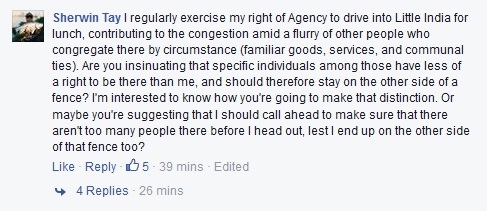SINGAPORE – Member of Parliament (MP) Denise Phua has apologised for referring to large crowds in Little India as “walking time-bombs” in her Budget debate speech on Thursday (April 7).
The MP for Jalan Besar GRC had been speaking about the prevention of public disorder in the area, as she said that residents wanted to ensure that incidents like the December 2013 riot will not happen again.
In her speech, Ms Phua said that she noticed that the crowd situation at Little India had returned to pre-riot levels, and added that “congregations of such high density are walking time-bombs and public disorder incidents waiting to happen”.
“It is important that we do not take our eyes off this matter lest we want history to repeat itself,” she said.
She also provided four suggestions to reduce the likelihood of disorderly conduct, including ring-fencing residential communal areas such as playgrounds and void decks.
Many netizens took to social media to voice their unhappiness after some media sites such as Mothership.sg and The Independent highlighted Ms Phua’s comments in their reports.
In a Facebook post on April 8, Ms Phua said she had no intentions of undermining any specific group, and acknowledged that she should not have used the phrase “walking time-bombs” to describe high-density congregations.
“I personally get along very well with the foreign cleaners in my constituency. To them and the other foreign workers in our country, thank you for your help and please accept my sincere apology if I have caused you concern,” she said in her post.
Comments on the post have so far mixed. While many supported and thanked the MP for clarifying her comments, some Facebook users remained unconvinced.
One netizen identified as Sherwin Tay asked if some groups of people are not welcomed in the area, and how the suggestions Ms Phua raised would actually solve the problem of congestion.

He said in his post: “I regularly exercise my right of Agency to drive into Little India for lunch, contributing to the congestion amid a flurry of other people who congregate there by circumstance (familiar goods, services, and communal ties). Are you insinuating that specific individuals among those have less of a right to be there than me, and should therefore stay on the other side of a fence? I’m interested to know how you’re going to make that distinction.
“Or maybe you’re suggesting that I should call ahead to make sure that there aren’t too many people there before I head out, lest I end up on the other side of that fence too?”
Here is Ms Phua’s Budget debate speech in full:
“Mr Melvin Yong and I are the local Members of Parliaments taking care of the residents of Little India. We wish to speak on behalf of our residents to ensure that the Little India riot of December 2013 will not happen again. The riot being the worst public disorder in Singapore in more than 40 years.
We are thankful for the post-riot recommendations of the Committee of Inquiry (COI) regarding alcohol restrictions, beefing up of police operations and patrols and the decentralisation of crowds to recreation centres in the rest of Singapore.
Recently, I was at Little India with Home Affairs Minister Shanmugam and members of the Police Force. It was obvious that the pre-riot crowds have returned to Little India. Madam, congregations of such high density are walking time-bombs and public disorder incidents waiting to happen. It is important that we do not take our eyes off this matter lest we want history to repeat itself. I hence wish to ask fo r Minister’s update of his plans in regard to this matter. I also ask for his favourable considerations of the following suggestions:
(1) Form a high-level multi-agency Task Force to mitigate the security and dis-amenity risks of high congestion of visitors to Little India;
(2) Ring-fence the Communal Areas of Residents such as the playgrounds and void decks so that the old and the young get to use the space meant for them;
(3) Continue with and do not stop resourcing the recommendations of the Committee of Inquiry viz-a-viz alcohol consumption restrictions and patrol teams;
(4) Decentralise further by building more recreation centres outside Little India; and
(5) Engage regularly through planned dialogues with all key stakeholders, the foreign workers, agents, businesses and residents.
The contributions of the foreign workers benefit our entire nation as they help build much of our nation’s infrastructure. We need them and we accept that foreign workers like the rest of us, have social and leisure needs amongst other needs.
The issue is not a Little India locality issue. It is a national issue that can only be solved by carefully balancing the needs of all stakeholders – the workers, the residents, the businesses and the rest of Singapore.”
ljessica@sph.com.sg


























